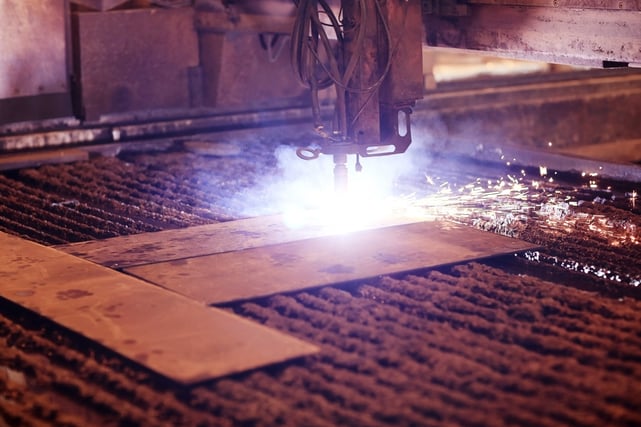Automation is changing the way the manufacturing industry operates. Processes that used to require manpower can now be carried out by robotic labor. As more processes become automated, manufacturers are beginning to rethink their day-to-day operations. Because they’re able to take on more projects without necessary added manpower, shops are restructuring the way they operate, causing a gradual restructuring of the whole industry. Read below to learn about the effects of automation on the manufacturing industry.

Increased Efficiency
The rise of automation technology in manufacturing means that robotic labor is taking on roles that people used to be in charge of. The result of this shift is a drastic increase in efficiency of manufacturing processes. Machines don’t need to rest like people and work faster. You can run machines overnight and without stopping, increasing productivity. Automation allows shops to get more work done at a faster pace without extra manpower. Shops can expect quicker turn around times. There will also be less wait times in between projects. Overall, automation is greatly increasing the efficiency of the manufacturing industry, allowing shops to create more products at faster rates.
Lower Costs
While the initial cost of purchasing machines for your shop will be high, over time, they’ll cut costs. Automation will allow your shop to produce more without paying for extra labor. In addition to seeing higher profits the more you invest in automation, you’ll have the ability to pay your workers more. You will be able to invest in improvements in your shop and new training for your employees. Manufacturers who choose to invest in automation are seeing the long-term benefits of profit increase, leading to funds that can be invested in other areas of improvement around their shops. Those that choose to invest in new technology will be able to improve all aspects of their shops, leading to better, more efficient, and safer manufacturing practices.
Improved Quality Control
Because automation involves manufacturing processes being carried out by machines programmed by computer algorithms, there is much less room for human error than processes carried out by people. In addition to more precise processes, new algorithms are allowing for machines to learn. Machines can now self-correct errors and make appropriate adjustments to prevent future ones. They can make complex decisions, identify defects for quality control, and create predictive and adaptive maintenance procedures. Automation and machine learning are allowing for better manufacturing through more precise procedures and quality control that does not require human intervention.
Shifts in Manufacturing Jobs
One of the biggest concerns that those in the manufacturing industry have about improvements in automation technology is the loss of jobs. It’s true that automated processes make certain jobs obsolete, but rather than eliminating jobs, automation is creating new types of jobs. There will always be a need for the human qualities that machines cannot possess such as intuition, creativity, and care. For the most part, tasks that are being automated are repetitive, straining, and time consuming. Allocating these tasks to machines allows manufacturers to create more human roles for collaboration, communication, and problem solving.
The best way to avoid cutting jobs in manufacturing is to focus on retraining. Fortunately, automation leads to more efficient manufacturing, leading to increased profits that can easily to be spent this way. Education is improving to give different skillsets to those in the manufacturing field. Workers don’t have to worry about losing a job or changing industries, they simply need to be willing to train for more collaborative and problem-solving based roles in the industry they have always known. Because shops are gradually adopting automated machines rather than changing all at once, they can gradually retrain employees to take on these new roles. Additionally, each shop will make individual decisions about which processes will be the most efficient and cost-effective to automate and which processes are better left to the workers.
A Changing Industry
Technology is advancing at a rapid rate, causing drastic changes across most industries. Manufacturing is no different, with automation taking over the roles that humans once had, making certain jobs obsolete. The best thing that manufacturers can do to stay relevant in the modern age is to embrace the change. Invest in automation and new technology that will ultimately lead to better and smarter manufacturing processes. The more manufacturers focus on the future, the more concerned they’ll be with retraining employees to prepare them for new types of roles in the modern age. Human labor is not becoming obsolete in the technology age. In fact, it’s even more important than ever. Smart manufacturers are investing in automation for mundane tasks and more complex roles for their employees to stay relevant in the modern age.
CAMM Metals | CT Welding and Manufacturing Company
It's crucial to do your research when choosing a metal fabrication, as not all companies are capable of completing the same quality of work. CAMM Metals has years of experience, honing our skills across the board to deliver a quality product and measurable bottom line value to our customers.



